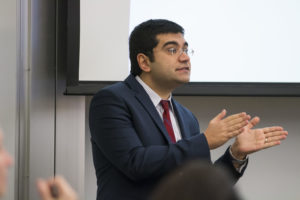By Nathaniel Luce
We asked faculty members from a variety of subject areas a simple question – what’s on your mind?
Brian McCann – Associate Professor of Strategic Management
 This article caught my attention because it challenges a significant argument in one of the most popular articles in strategy (Michael Porter’s “What is Strategy?” – which is assigned as a reading in many core strategy classes).
This article caught my attention because it challenges a significant argument in one of the most popular articles in strategy (Michael Porter’s “What is Strategy?” – which is assigned as a reading in many core strategy classes).
Porter distinguishes between “strategy” (doing different things than rivals) and “operational effectiveness” (doing similar things but doing them better) and argues that operational effectiveness is unlikely to be the source of sustainable advantage because it can be more easily imitated. I think the authors are right that Porter’s view understates the importance to strategy of what they call “competent management.”
Bruce Barry – Brownlee O. Currey, Jr. Professor of Management
It occurs to me that the frustration many experience at the toxic and polarized nature of discourse risks triggering an overreaction in which a quest for “mutual understanding” turns us away from the difference between truth and fiction, and away from moral candor.
In a no doubt well-intentioned move, our daily paper here in Nashville, The Tennessean, has just launched what it is calling a Civility Tennessee campaign because (quoting from their introduction of the so-called campaign) “We have all been complicit… in not doing all we can to create, protect and nurture an environment of mutual understanding and respect even, and especially, when we disagree with each other.”
 In a similar vein, the New York Times today (Jan. 18) turned over its entire editorial page to letters from self-identified Trump voters “in hopes of helping readers who agree with us better understand the views of those who don’t.” The letters in the Times, while somewhat revealing, are in significant measure an anthology of misrepresentations and falsehoods. I suppose one could argue that that’s beside the point – at some level civility entails an understanding of others’ delusions, not just their truths. But my fear is that when we elevate the importance of “civil dialogue” and “mutual understanding” to a higher moral plane than the clash of legitimately competing ideas, we don’t become more civilized, we just become more stupid.
In a similar vein, the New York Times today (Jan. 18) turned over its entire editorial page to letters from self-identified Trump voters “in hopes of helping readers who agree with us better understand the views of those who don’t.” The letters in the Times, while somewhat revealing, are in significant measure an anthology of misrepresentations and falsehoods. I suppose one could argue that that’s beside the point – at some level civility entails an understanding of others’ delusions, not just their truths. But my fear is that when we elevate the importance of “civil dialogue” and “mutual understanding” to a higher moral plane than the clash of legitimately competing ideas, we don’t become more civilized, we just become more stupid.
Although it’s the world of politics and public affairs that triggers this thinking, the risks of privileging reconciliation over dialectic apply to analysis and decision making in the business world as well.
Kelly Goldsmith – Associate Professor of Marketing
 I came across this article and was intrigued by the discussion around the fact that the experience of scarcity (i.e., feeling that one has less than one needs to attain their goals and desires) is not restricted to those living in objective conditions of scarcity, such as those living in poverty or those with restricted access to critical resources.
I came across this article and was intrigued by the discussion around the fact that the experience of scarcity (i.e., feeling that one has less than one needs to attain their goals and desires) is not restricted to those living in objective conditions of scarcity, such as those living in poverty or those with restricted access to critical resources.
Indeed, a variety of relatively mundane, everyday experiences, such as running low on gas or learning the new release of iPhones will be limited in quantity, can cause consumers to feel like they “don’t have enough.” Thus, here in the U.S., even though many people live in relatively affluence as compared to others across the world, consumers regularly experience feelings of scarcity. Understanding how and why such concerns impact our consumption behavior is fascinating to me.
Josh White – Assistant Professor of Finance
 Without a doubt, the most intriguing thing in my mind is whether or not initial coin offerings (ICOs) are a legitimate source of funding for early-stage tech companies. Data show that more capital was raised via ICOs than early stage VC funding in 2017, yet many ICOs just funded scams. It will be interesting to see if this trend is just part of the cryptomania around anything blockchain-related these days or if ICOs are just a natural evolution of capital raising, like crowdfunding. This Forbes article does a nice job of describing this space.
Without a doubt, the most intriguing thing in my mind is whether or not initial coin offerings (ICOs) are a legitimate source of funding for early-stage tech companies. Data show that more capital was raised via ICOs than early stage VC funding in 2017, yet many ICOs just funded scams. It will be interesting to see if this trend is just part of the cryptomania around anything blockchain-related these days or if ICOs are just a natural evolution of capital raising, like crowdfunding. This Forbes article does a nice job of describing this space.
Yasin Alan – Assistant Professor of Operations Management
I have been closely following Amazon’s Whole Foods acquisition – it has many aspects related to my research and teaching.
 Whole Foods provides Amazon with a few supply-chain-related opportunities. Amazon may leverage Whole Foods’s strong private label brand. Amazon is already using Whole Foods locations for last mile delivery of non-perishable products; Whole Foods may also help Amazon strengthen its online grocery business, AmazonFresh. I am curious to see whether and to what extent Amazon will be able create synergies between its online presence and Whole Foods’s stores and distribution network.
Whole Foods provides Amazon with a few supply-chain-related opportunities. Amazon may leverage Whole Foods’s strong private label brand. Amazon is already using Whole Foods locations for last mile delivery of non-perishable products; Whole Foods may also help Amazon strengthen its online grocery business, AmazonFresh. I am curious to see whether and to what extent Amazon will be able create synergies between its online presence and Whole Foods’s stores and distribution network.
Recommended reading: